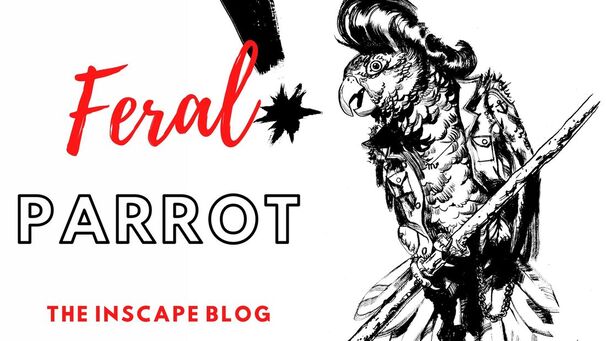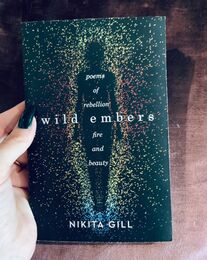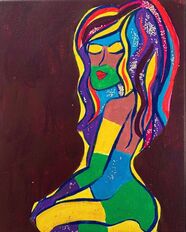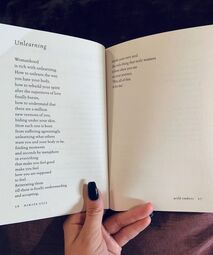- Folio No. 9
- About
- Feral Parrot : The Blog
- INTERVIEWS
- SUBMISSIONS
-
ISSUE ARCHIVE
- PRINT Chapbook No.6 Healing Arts
- Online Issue No.9
- Online Issue No.1 Fall 2016
- Online Issue No.2 Spring 2017
- ONLINE Issue No.3 Fall 2017
- PRINT Vol 72 No 2 Fall 2017
- PRINT Vol 73 No.1 Fall 2018
- ONLINE Issue No. 4 Fall 2018
- Online Issue No.5 Summer 2018
- FOLIO No.1 Fall 2018 VOTE
- ONLINE Issue No.6 Fall 2018 Fall Spirituality
- FOLIO 2 Fall 2019 Celebrating Dia De Los Muertos
- FOLIO No.3 -- Moon Moon Spring 2019
- FOLIO No.4 Celebrating New PCC Writers
- FOLIO No.5 City of Redemption
- FOLIO No.6 Spring 2020
- FOLIO No. 7 - Winter 2021 Into the Forest
- 2022 Handley Awards
- Inscape Alumni Board
- PRINT Chapbook No. 7 Healing Arts
- Blog
- Untitled
Written by Cassie WilsonSomebody once told me that my face was the prettiest thing about me. That my body wasn’t enough. Somebody once told me that if I worked out a little more and ate a little less I could be pretty enough. But enough for what I asked myself? Somebody once told me that losing the weight would be the greatest accomplishment of my life. That if I shrunk myself down to smaller size that I would float across the street with a god like happiness that would burst out of my body, sun rays that hit windows with reflections of rainbows and light on a warm summer's day. And I asked myself how being smaller could amount to such a feeling? Somebody once told me that being fat was my worst characteristic. That my stretch marks were flaws etched into my skin as a remainder of why I wasn’t worth it. And I wondered to myself how being fat, could be the problem? Somebody once told me that when I lost the weight everything else would melt away like honey in hot tea and I would be happy. And so when I lost the weight and the weight in my head still pressed hard like mountains of snow inside a blizzard I wondered if maybe I just hadn’t lost enough? Somebody once told me I just needed to tone some more and lift some weights and loose the excess around my waist, that would do it. I could be happy. So when I shed the pounds and built the muscle and still the weight in my head pounded like bricks in concrete being set in stone not able to lift from place, I wondered, if maybe my body just wasn’t built for warm summer days? After I lost the weight I was left with a version of myself I didn’t recognize. I found myself inside my bathroom, feet against chest, ready to unlearn all the parts of myself that shrunk me. For my birthday last year I was given Nikita Gill's book, Wild Embers, poems of rebellion, fire and beauty. Gill writes about the the process of "unlearning", how to dig yourself back up from the rubble of your own making, from the self negative statements and all the somebody's who told you you weren't worth it. In Nikita Gill’s poem, “Unlearning”, she writes: "Womanhood is rich with unlearning. How to unlearn the way you hate your body, how to rebuild your spirit after the supernova of love finally bursts, how there are a million new versions of you hiding under your skin.” When Gill references the "supernova of love" that bursts and beams, she is talking about the breaking point. The knees against chest, the aftermath of a self critical crock pot, the main ingredient: self-loathing. She refers to this moment as a burst of love because when you hit this point, the point when you just can't go on any longer, it's the moment you say to yourself: I chose me, because I matter. And that is the first time in a series of self destruction that you chose yourself instead of your crock pot. When I stopped listening to somebody’s and just finally chose me, that promised god like happiness that bursted and beamed and made me float, came and I was shocked to find it wasn’t from losing the weight. At 23 years old the greatest accomplishment in my life was gaining and not losing. Gaining love and acceptance and forgiveness and I feel heavier and I am worth it. It took me a year and a half to lose the weight and I ended up losing what made me beautiful to begin with. I lost the passion I had for writing and the way I loved the freckles on my skin and the curls that dance on my shoulders. I lost the smile that used to light up my face when I laughed and how I could dance and not care if my body moved with a fierceness that was not afraid to take up the space that I deserve. So when I sat with myself a sum of a number lighter I realized the only weight I needed to loose was the hate and shame and self loathing that society's somebody's had mounted on me like rider against horse, guiding me to all the wrong places. And I asked myself why I ever started listening to somebody’s. Gill writes, “How each one is born from suffering and agonizingly, unlearning what others want you and your body to be, finding moments and seconds by metaphors in everything that make you feel good make you feel how you are supposed to feel.” When Gill writes that some of the best parts about ourselves are "born from suffering and agonizingly" she is referring to the parts about us that learned to stand up and fight. To choose our own warm summers days. The prettiest thing about me was never my face and fat is not an insult. Fat is a word used to try to discredit the amount of space a woman deserves to take up. I am enough and so is every other woman ever called fat because fat is and never will be a negative aspect of what makes up a person. Since when did fat become a word thrown around to discredit a person’s soul and spirit and wholeness. What others want me and my body to be is not a problem, but a note to be thrown in a suggestion box of nobody gives a fuck. My god like happiness came from my “feel good metaphors” that were and are warm cookies in bed and a chocolate milkshake after dinner and me telling me and anyone else: I am here, I am enough, and I will not shrink the space in this universe that I deserve. Gill finishes her poem writing, “Reiterating them till there is finally understanding and accepting, inside your very soul the only thing that truly matters is how often you say on your journey, ‘This, all of this, is for me.’” This life is mine and I will never apologize for taking up more metric units again because the problem was never the number. The prettiest thing about me is and will always be all the things that make me heavy. My stretch marks etched in my skin are my triumphs over hardships and the nights I spent unlearning the parts of myself that told me to listen to somebody’s. My waist encompasses the length I’ve spent working on me, for me, because I matter. My weight will never define my self worth and fat will never be an insult. When Gill writes, "This, all of this, is for me" she is referencing this journey of life for the individual. It is personal and unique and important and yours. How you live your life, learning or unlearning, is all your own, there isn't a need to take suggestions from bystanders who think their suggestions could amount to the absolute beauty that is your spirit and soul. So the next time somebody tells me I am fat I will thank them for their consideration in noticing the home I’ve built for myself in a body that carries my spirit and soul. Cassie Wilson is a student at Pasadena City College majoring in English. She says, "I won't ever stop talking about the relationship between ourselves and our bodies. It's such an important topic and I hope that with my own experience I can create or inspire some positive change in the way we treat, talk, and view our bodies."
1 Comment
7/7/2024 10:41:30 pm
Nikita Gill's "Wild Embers" with its "Societies Somebodies" resonates deeply. It hits home the way we lose parts of ourselves under the weight of societal expectations. I can relate to the dimming of that inner light, the silencing of laughter, the taming of our wildness. But the poem's message of unlearning and rediscovering ourselves is empowering. It makes me want to shed those external pressures and reconnect with the things that make me feel truly alive.
Reply
Leave a Reply. |
IMPORTANT NOTE:
PCC Inscape Magazine, housed at Pasadena City College, is following Coronavirus protocols. At this time our staff continues to read submissions and publish web content. Note:
Blog Posts reflect the opinions of the writer and not the opinions of Pasadena City College or Inscape Magazine Editorial Staff Members. Archives
December 2023
Categories
All
|





 RSS Feed
RSS Feed